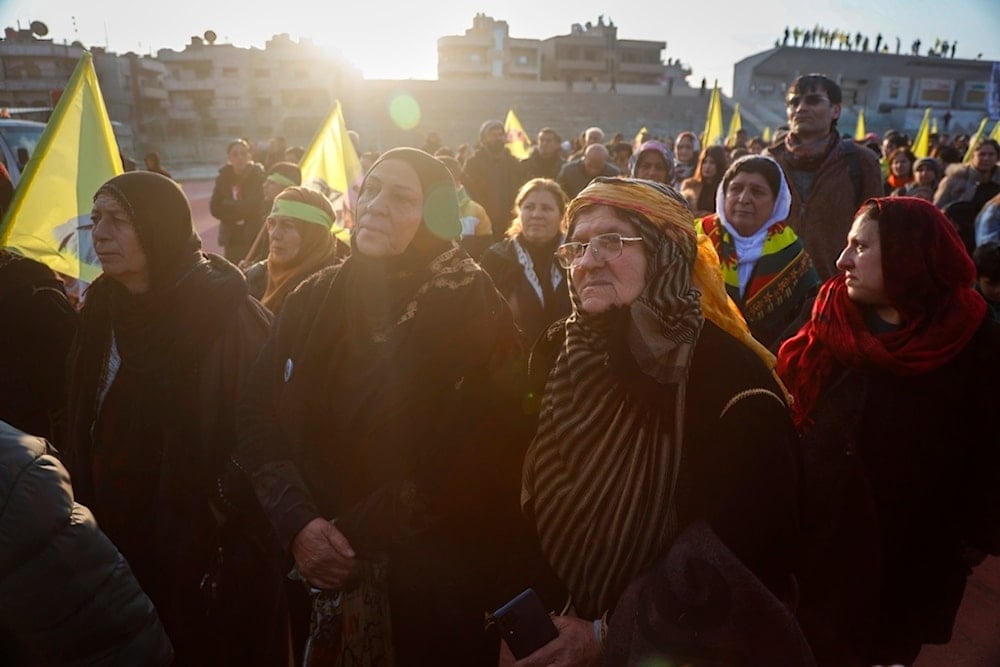Report: Turkiye, PKK reach covert deal to end armed conflict
Independent Türkçe reveals secret deal between Turkiye and the PKK to end armed conflict, dissolve the group, and shift to political engagement.
-

Kurdish women watch live as a Pro-Kurdish Peoples' Equality and Democracy Party, or DEM, delegation members release a statement from PKK leader Abdullah Ocalan, in Qamishli, northeastern Syria, Thursday, Feb. 27, 2025 (AP)
A report by Independent Türkçe has revealed the existence of an undisclosed agreement between the Turkish state and the Kurdistan Workers’ Party (PKK), aimed at ending the decades-long armed conflict and transitioning the group entirely into legal political activity.
According to the report, the terms of the deal include the full cessation of both military and political confrontation by the PKK, the dissolution of the organization, and the enforcement of a complete ban on PKK-related activities across Turkiye, Iraq, Iran, and Syria. The agreement also outlines a process for disarmament to be coordinated by a joint committee, with the PKK’s presidential council overseeing its execution.
Newsat Çiçek, Editor-in-Chief of Independent Türkçe and author of the report, stated that Turkiye played a guarantor role in the conference where the initiative was formalized, alongside other mediating parties. He noted that the conference took place with the direct knowledge and supervision of Turkish state authorities.
One day prior to the conference, Turkish President Recep Tayyip Erdoğan hinted at the developments, stating that “important news on this matter will be shared in the coming days.”
Deeper layer of talks
A critical element of the report involves the role of jailed Kurdish leader Abdullah Öcalan, who reportedly met with the PKK leadership ahead of the conference to relay Ankara’s proposal and provided a recorded video message that was broadcast during the event. According to the PKK’s internal rules, any such decisions must be ratified by Öcalan himself, who remains its historical leader.
Çiçek emphasized that the leaked details represent only a fraction of the broader and more detailed negotiations that took place between Ankara, Öcalan, and PKK officials based in the Qandil Mountains.
Sources close to the organization suggest that what has been made public constitutes less than 10% of the actual content, which includes precise stages for disarmament and the political future of the movement.
While there has been no official confirmation from the Turkish government or the PKK, the report has stirred widespread speculation over a potential shift in one of the most protracted and bloody conflicts in the region.
PKK, Turkiye agree on ceasefire
The PKK announced an immediate ceasefire in March, according to a news agency affiliated with the group, following a call by its jailed leader for disarmament.
The move marks a significant step toward ending the PKK’s four-decade-long insurgency against the Turkish state.
On Thursday, Öcalan urged the PKK to lay down its arms and dissolve, a call that has received support from both President Tayyip Erdogan's government and the opposition pro-Kurdish DEM party.
If successful, the initiative could have far-reaching regional implications while bringing an end to a conflict that has claimed more than 40,000 lives since the PKK, now headquartered in the mountains of northern Iraq, launched its armed campaign in 1984.
In its statement, the group expressed hope that Ankara would release Öcalan, who has been held in near-total isolation since 1999, so he could oversee the disarmament process.
SDF distinguishes self from PKK
While welcoming Ocalan’s appeal, the US-backed Syrian Democratic Forces (SDF), which Ankara considers an extension of the PKK, clarified that the call did not apply to them.
Turkiye has repeatedly urged the SDF’s armed wing to disarm since the fall of Syrian President Bashar al-Assad last year, warning that failure to do so would result in military action.
Ocalan’s appeal, which was triggered by an unexpected proposal in October from an ultra-nationalist ally of Erdogan, has been welcomed by the United States, the European Union, and other Western allies, as well as by Turkiye’s neighbors, Iraq and Iran.
Since Ocalan's imprisonment, multiple efforts have been made to negotiate an end to the conflict. The most recent peace talks collapsed in 2015, and no further engagement took place until October 2023.

 4 Min Read
4 Min Read








